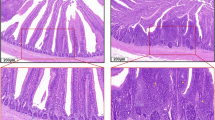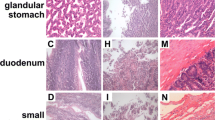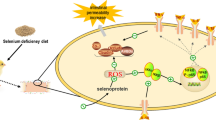Abstract
The aim of the present study was to examine the effect of selenium (Se) deficiency on the expression of selenoproteins in chicken muscular stomach and to detect the correlation of selenoproteins with muscular stomach injuries. One-day-old broiler chickens were maintained for 55 days on a normal diet (0.2 mg/kg) or a Se-deficient diet (0.033 mg Se/kg). The expression levels of 25 selenoproteins, heat shock proteins (HSPs), and inflammatory factors were then examined by real-time PCR. Following this, the correlation between selenoproteins, HSPs, and inflammatory factors was analyzed by principal component analysis (PCA). The results showed that Se deficiency decreased the expression of 25 selenoproteins (P < 0.05), but increased the expression of HSP27, HSP40, HSP60, HSP70, and HSP90, and NF-κB, iNOS, TNF-α, COX-2, and HO-1 (P < 0.05). Selenoproteins showed a high negative correlation with HSPs and inflammatory factors. Thus, the results suggested that Se deficiency induced muscular stomach injuries by decreasing the expression of selenoproteins. In addition, selenoproteins play an important role in regulating HSPs and inflammatory response. The muscular stomach is a key target of Se deficiency and may play a special role in response to Se deficiency.




Similar content being viewed by others
References
Pappas AC, Zoidis E, Surai PF et al (2008) Selenoproteins and maternal nutrition. Comp Biochem Physiol B Biochem Mol Biol 151:361–372
Pavlovic Z, Miletic I, Jokic Z et al (2010) The effect of level and source of dietary selenium supplementation on eggshell quality. Biol Trace Elem Res 133:197–202
Coudray C, Hida H, Boucher F et al (1996) Effect of selenium supplementation on biological constants and antioxidant status in rats. J Trace Elem Med Biol 10:12–19
Yao HD, Wu Q, Zhang ZW et al (2013) Gene expression of endoplasmic reticulum resident selenoproteins correlates with apoptosis in various muscles of se-deficient chicks. J Nutr 143:613–619
Yao H, Zhao W, Zhao X et al (2014) Selenium deficiency mainly influences the gene expressions of antioxidative selenoproteins in chicken muscles. Biol Trace Elem Res 161:318–327
Liu CP, Fu J, Lin SL et al (2014) Effects of dietary selenium deficiency on mRNA levels of twenty-one selenoprotein genes in the liver of layer chicken. Biol Trace Elem Res 159:192–198
Yu D, Zhang Z, Yao H et al (2015) The role of selenoprotein W in inflammatory injury in chicken immune tissues and cultured splenic lymphocyte. Biometals 28:75–87
Zhang JL, Xu B, Huang XD et al (2016) Selenium deficiency affects the mRNA expression of inflammatory factors and selenoprotein genes in the kidneys of broiler chicks. Biol Trace Elem Res 171:201–207
Zhao X, Yao H, Fan R et al (2014) Selenium deficiency influences nitric oxide and selenoproteins in pancreas of chickens. Biol Trace Elem Res 161:341–349
Lin SL, Wang CW, Tan SR et al (2014) Selenium deficiency inhibits the conversion of thyroidal thyroxine (T) to triiodothyronine (T) in chicken thyroids. Biol Trace Elem Res 161(3):263–71
Kieliszek M, Blazejak S (2013) Selenium: significance, and outlook for supplementation. Nutrition 29:713–718
Mariotti M, Ridge PG, Zhang Y et al (2012) Composition and evolution of the vertebrate and mammalian selenoproteomes. PLoS One 7:e33066
Dikiy A, Novoselov SV, Fomenko DE et al (2007) SelT, SelW, SelH, and Rdx12 genomics and molecular insights into the functions. Biochemistry 46:6871–6882
Yao HD, Liu W, Zhao WC et al (2014) Different responses of selenoproteins to the altered expression of selenoprotein W in chicken myoblasts. RSC Adv 4:64032
Bellinger FP, Raman AV, Reeves MA et al (2009) Regulation and function of selenoproteins in human disease. Biochem J 422:11–22
Yao HD, Wu Q, Zhang ZW et al (2013) Selenoprotein W serves as an antioxidant in chicken myoblasts. Biochim Biophys Acta 1830:3112–3120
Yao H, Fan R, Zhao X et al (2016) Selenoprotein W redox-regulated Ca2+ channels correlate with selenium deficiency-induced muscles Ca2+ leak. Oncotarget 7(36):57618–57632
Martinez A, Santiago JL, Varade J et al (2008) Polymorphisms in the selenoprotein S gene: lack of association with autoimmune inflammatory diseases. BMC Genomics 9:329
Verma S, Hoffmann FW, Kumar M et al (2011) Selenoprotein K knockout mice exhibit deficient calcium flux in immune cells and impaired immune responses. J Immunol 186:2127–2137
Fatmi W, Kechrid Z, Naziroglu M et al (2013) Selenium supplementation modulates zinc levels and antioxidant values in blood and tissues of diabetic rats fed zinc-deficient diet. Biol Trace Elem Res 152:243–250
Esworthy RS, Yang L, Frankel PH et al (2005) Epithelium-specific glutathione peroxidase, Gpx2, is involved in the prevention of intestinal inflammation in selenium-deficient mice. J Nutr 135:740–745
Placha I, Borutova R, Gresakova L et al (2009) Effects of excessive selenium supplementation to diet contaminated with deoxynivalenol on blood phagocytic activity and antioxidative status of broilers. J Anim Physiol Anim Nutr (Berl) 93:695–702
Yu J, Yao H, Gao X et al (2015) The role of nitric oxide and oxidative stress in intestinal damage induced by selenium deficiency in chickens. Biol Trace Elem Res 163:144–153
Peirson SN, Butler JN, Foster RG (2003) Experimental validation of novel and conventional approaches to quantitative real-time PCR data analysis. Nucleic Acids Res 31:e73
Livak KJ, Schmittgen TD (2001) Analysis of relative gene expression data using real-time quantitative PCR and the 2(−Delta Delta C(T)) method. Methods 25:402–408
Behne D, Hofer T, von Berswordt-Wallrabe R et al (1982) Selenium in the testis of the rat: studies on its regulation and its importance for the organism. J Nutr 112:1682–1687
Li JL, Li HX, Li S et al (2012) Effects of selenoprotein W gene expression by selenium involves regulation of mRNA stability in chicken embryos neurons. Biometals 25:459–468
Sunde RA, Raines AM, Barnes KM et al (2009) Selenium status highly regulates selenoprotein mRNA levels for only a subset of the selenoproteins in the selenoproteome. Biosci Rep 29:329–338
Luan Y, Zhao J, Yao H et al (2015) Selenium deficiency influences the mRNA expression of selenoproteins and cytokines in chicken erythrocytes. Biol Trace Elem Res 171(2):427–436
Liang Y, Lin SL, Wang CW et al (2014) Effect of selenium on selenoprotein expression in the adipose tissue of chickens. Biol Trace Elem Res 160:41–48
Pando MP, Verma IM (2000) Signal-dependent and -independent degradation of free and NF-kappa B-bound IkappaBalpha. J Biol Chem 275:21278–21286
Jeong DW, Yoo MH, Kim TS et al (2002) Protection of mice from allergen-induced asthma by selenite: prevention of eosinophil infiltration by inhibition of NF-kappa B activation. J Biol Chem 277:17871–17876
Youn HS, Lim HJ, Choi YJ et al (2008) Selenium suppresses the activation of transcription factor NF-kappa B and IRF3 induced by TLR3 or TLR4 agonists. Int Immunopharmacol 8:495–501
Vincent JL, Forceville X (2008) Critically elucidating the role of selenium. Curr Opin Anaesthesiol 21:148–154
Curran JE, Jowett JB, Elliott KS et al (2005) Genetic variation in selenoprotein S influences inflammatory response. Nat Genet 37:1234–1241
Al-Aqil A, Zulkifli I (2009) Changes in heat shock protein 70 expression and blood characteristics in transported broiler chickens as affected by housing and early age feed restriction. Poult Sci 88:1358–1364
Bernabo P, Rebecchi L, Jousson O et al (2011) Thermotolerance and hsp70 heat shock response in the cold-stenothermal chironomid Pseudodiamesa branickii (NE Italy). Cell Stress Chaperones 16:403–410
Zhao J, Xing H, Liu C et al (2016) Effect of selenium deficiency on nitric oxide and heat shock proteins in chicken erythrocytes. Biol Trace Elem Res 171:208–213
Acknowledgements
This study was supported by the National Natural Science Foundation of China (31602028).
Author information
Authors and Affiliations
Corresponding author
Ethics declarations
All procedures used in this study were approved by the Institutional Animal Care and Use Committee of Northeast Agricultural University.
Conflict of Interest
The authors declare that they have no conflict of interest
Rights and permissions
About this article
Cite this article
Huang, X., Sun, B., Zhang, J. et al. Selenium Deficiency Induced Injury in Chicken Muscular Stomach by Downregulating Selenoproteins. Biol Trace Elem Res 179, 277–283 (2017). https://doi.org/10.1007/s12011-017-0946-x
Received:
Accepted:
Published:
Issue Date:
DOI: https://doi.org/10.1007/s12011-017-0946-x




